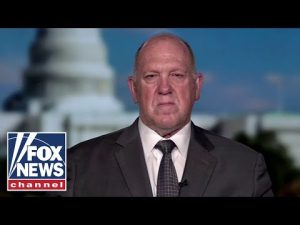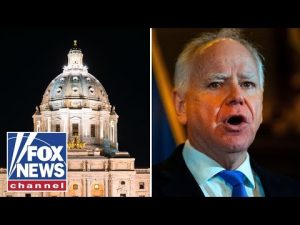In a world that feels like it’s spinning faster than a merry-go-round at a summer carnival, discussions around politics and culture are often a rollercoaster ride. Recently, two savvy commentators, Michele Tafoya, the bright host of the Michele Tafoya podcast, and Hadley Heath Manning, the energetic executive vice president of the Steamboat Initiative, took a turn on this political ride while tackling some sticky issues. Their conversation touched on everything from the meaning of identity to the policies surrounding what flags fly over U.S. government buildings.
The topic steered into the realm of “woke” culture, and Michele expressed a hope that we might soon take a detour away from this trend. It seems that many people are growing weary of constant discussions around pronouns—what happened to just being “Michele” or “Hadley”? Historically, forms used to ask for basic information rather than delving into the nuances of identity. Michele aptly pointed out that there’s something absurd about being asked for your pronouns on a medical form. The hope is that these discussions remain in the past, allowing society to drive forward without the confusing roadblocks of contemporary identity politics.
Hadley chimed in with a timely nod to policy changes introduced during President Trump’s administration, specifically the one flag policy. This policy puts the American flag front and center at U.S. embassies and government outposts, eliminating the chance for other flags, such as those representing movements or special interests, to overshadow the symbol of national unity. According to Hadley, embassies represent every American, so it makes sense to simplify the scene to one beloved banner that embodies freedoms and rights for all, rather than allowing a “clutter” of flags that can be divisive.
This conversation morphs into a greater commentary on the notion of identity in relation to government practices. Hadley reminded viewers that even if individuals have their own personal lives and choices—like deciding how they dress or what name they use—government identification should present a clear and realistic portrayal of who a person is. It’s about keeping things balanced and truthful, especially when it comes to health data and security measures. After all, if someone is born on January 1, 1980, it’s a little cheeky to insist they’re celebrating their 30th birthday in the year 2023.
But the pundits also recognized a potential backlash. They predicted that political opponents might ramp up their arguments, suggesting that these policies are rooted in anger or discrimination, comparing current leaders to dictators of the past. This emphasis on presenting truth can easily lead to misunderstandings in the heated political climate we’re navigating today. People from all walks of life are getting tired of the “gaslighting” past images they’ve been sold on social media and in the news. An understanding is blossoming among the population that many have had enough of culture wars.
In summary, while navigating the ever-changing landscape of modern politics, Michele Tafoya and Hadley Heath Manning underscore the importance of clarity and shared values. They highlight the need for an end to the chaos, promoting a return to a point where people can feel comfortable again in their identities while the focus shifts back to the common good. With seemingly endless topics to discuss, it remains to be seen whether we can truly steer our way out of this “woke” traffic jam or if we’re resigned to hitting the brakes for just a little while longer. Regardless, it’s clear that many are eager for a fresh perspective and a chance to focus on what really unites us as Americans.







